Russell “Texas” Bentley returned to The Grayzone alongside regular Toward Freedom contributor Fergie Chambers to detail their experiences documenting the war in the Donbass region. Chambers discussed his recent visit to a dungeon of the Ukrainian state-backed Aidar Battalion, and his interviews with Donetsk-based communists, while Texas described being on the front lines with the Donetsk People’s Republic militia.
Related Articles
Related Articles
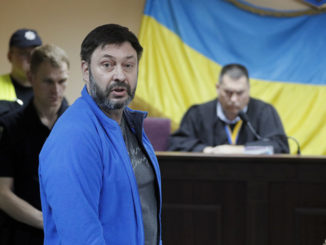
Accused of Treason and Imprisoned Without Trial: Journalist Kirill Vyshinsky Recounts His Harrowing Time In a Ukrainian Prison
Editor’s Note: The following report and the above video were originally published by MintPress News.
In November 2018, I became aware of the case of Kirill Vyshinsky, a Ukrainian-Russian journalist and editor imprisoned in Ukraine without trial since May 2018, accused of high treason.
Soon after, I interviewed Vyshinsky via email. He described his arrest and the accusations against him as politically-motivated, “an attempt by the Ukrainian authorities to bolster the declining popularity of [then] President [Petro] Poroshenko in this election year.”
Vyshinsky noted that his arrest was advancing the incessant anti-Russian hysteria now prevalent among Ukrainian authorities, as he holds dual Ukrainian and Russian citizenship. He noted that the charges against him, which pertain to a number of articles he published in 2014 (none of them authored by Vyshinsky), became of interest to Ukrainian authorities and intelligence services four years after they were published. To Vyshinsky, this supports the notion that neither the articles nor their editor were a security threat to Ukraine, instead, he says, they were a political card to be played.
In early 2019, I traveled to Kiev to interview Vyshinsky’s defense lawyer Andriy Domansky about the logistic obstacles of his client’s case. Domansky viewed the Vyshinsky case as politically motivated and expressed concern that he could himself become a target of Ukraine’s secret service for his role in defending his client, an innocent man.
Domansky told me at the time:
The Vyshinsky case is key in demonstrating the presence of political persecution of journalists in Ukraine. As a legal expert, I believe justice is still possible in Ukraine and I will do everything possible to prove Kirill Vyshinsky’s innocence.”
To the surprise of those following the case against Vyshinsky, in late August 2019 he was released with little fanfare after serving more than 400 days in a Ukrainian prison but still faces all of the charges brought against him by the Ukrainian government and is “obliged to appear in court or give testimony to investigators if they deemed it necessary.”
By early September, Kirill Vyshinsky was on a plane to Moscow. Despite never being tried or officially convicted, he found himself the subject of a prisoner exchange between the Russian and Ukrainian governments.
I interviewed Vyshinsky in Moscow in late September. He told me about his harrowing ordeal, the Ukrainian detention system, other persecuted journalists, and what lies ahead for him.
He also touched on the inhumane conditions he experienced in Ukrainian prisons. He noted that a pretrial detention center as we know it in Western nations is a very different entity in Ukraine and that Ukrainian prisons were so over-crowded that it was common for inmates to sleep in three shifts in order to allow enough standing room for inmates crammed into a cell.
Ukrainian Prisons Like a ‘Concentration Camp’
Aleksey Zhuravko, a Ukrainian deputy of the Verkhovna Rada of V and VI convocations recently published photos taken inside of an Odessa pretrial detention center showing utterly unsanitary and appalling conditions. Zhuravko noted, “I am shocked at what was seen. It is a concentration camp. It is a hotbed of diseases.”
Another Ukrainian journalist, Pavel Volkov, was subjected to the same types of accusations lobbed against Vyshinsky. Volkov spent over a year in the same pretrial detention center as Vyshinsky. He was arrested on September 27, 2017, after Ukrainian authorities carried out searches of his wife and mother’s apartments without the presence of his lawyer and with what he says, was a false witness.
Volkov spent more than a year in a pretrial detention center on charges of “infringing on territorial integrity with a group of people” and “miscellaneous accessory to terrorism.” On March 27, 2019, he was fully acquitted by a Ukrainian court.
Volkov shared his thoughts on the persecution of journalists in Ukraine, saying:
The leaders of the 2014 Euromaidan movement, who subsequently occupied the largest positions in the country’s leadership, repeatedly stated that collaborators from World War II who participated in the mass extermination of Jews, Russians, and Poles are true heroes in Ukraine, and that the Russian and Russian-speaking population of Ukraine are inferior people who need to be either forcibly re-educated or destroyed.
They also believe that anyone who wants peace with the Russian Federation, and who believes that the Russian language (the native language for over sixty percent of Ukraine’s population) should be the second state language, is the enemy of Ukraine.
These notions formed the basis of the new criminal law, designed to persecute politicians, public figures, journalists, and ordinary citizens who disagree with the above.
Since 2014, security services have arrested hundreds of people on charges of state treason; infringing on the territorial integrity of Ukraine; and assisting terrorism for criticizing the current government in the streets or on the Internet.
People have been in prison for years without a conviction. And these are not only the journalists included in the ‘Vyshinsky list’.
Activists from Odessa, Sergey Dolzhenkov and Evgeny Mefedov, have spent more than five years in jail just for laying flowers at a memorial to the liberators of Nikolaev [Ukrainian city] from Nazi invaders.
Sergeyev and Gorban, taxi drivers, have spent two and a half years in a pretrial detention center because they transported pensioners from Donetsk to Ukraine-controlled territory so that they could receive their legal pension.
The entrepreneur Andrey Tatarintsev has spent two years in prison for providing humanitarian assistance to a children’s hospital in the territory of the Lugansk region not controlled by Ukraine.
Farmer Nikolay Butrimenko received eight years of imprisonment for paying tax to the Donetsk People’s Republic for his land located in that territory.
The 85-year-old scientist and engineer Mekhti Logunov was given twelve years because he agreed to build a waste recycling plant with Russian investors. The list is endless.
People often incriminate themselves while being tortured or under the threat of their relatives being punished, and such confessions are accepted by the courts, despite the fact that lawyers initiate criminal proceedings against the security services involved in the torture. These cases are not being investigated.
The only mitigation that has happened in this direction after the change of government was the abolition of the provision of the Criminal Procedure Code stating that no other measure of restraint other than detention can be applied to persons suspected of committing crimes against the state.
This allowed some defendants to leave prison on bail, but not a single politically-motivated case has yet been closed. Moreover, arrests are ongoing.
The only acquittal to date from the so-called journalistic cases on freedom of speech is mine. However, it is still being contested by the prosecutor’s office in the Supreme Court.
Ninety-nine percent of the media continue to call all these people ‘terrorists’, ‘separatists’, and ‘enemies of the people’, even though almost none of them have yet received a verdict in court.”
Volkov’s words lay bare the true nature of the allegations made against Kirill Vyshinsky as well as the countless other journalists and citizens of Ukraine that have fallen victim to the heavy hand of Ukrainian authorities.
Eva Bartlett is a Canadian independent journalist and activist. She has spent years on the ground covering conflict zones in West Asia, especially in Syria and occupied Palestine, where she lived for nearly four years. She is a recipient of the 2017 International Journalism Award for International Reporting, granted by the Mexican Journalists’ Press Club (founded in 1951), was the first recipient of the Serena Shim Award for Uncompromised Integrity in Journalism, and was short-listed in 2017 for the Martha Gellhorn Prize for Journalism. See her extended bio on her blog, In Gaza.
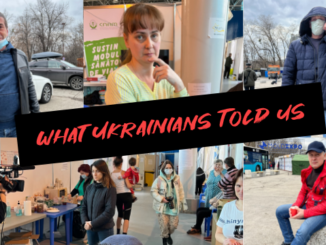
Exclusive: Ukrainian Refugees Spare No Words on Zelensky Gov’t, Moldova Local Calls 1st Wave of Refugees ‘Oligarchs’

CHISINAU, Moldova—Nestled above the Black Sea, between the war zone in Ukraine and the eastern limits of NATO territory in Romania, sits the tiny, oft-forgotten landlocked nation of Moldova. Among the poorest countries in Europe by just about any relevant metric, it has been overwhelmed by Ukrainian refugees in the three weeks since the outset of what Russia calls its “special military operation” (спецоперация) in Ukraine.
More than 359,000 people of the 3.38 million who have fled Ukraine since February 24 have passed in and out of the country, according to the United Nations Commissioner for Refugees. Roman Macovenco of the Moldovan Consular Directorate confirmed at least 300,000 Ukrainians had crossed through Moldova. The vast majority came through the border town of Palanca, just 57 kilometers (or 35 miles) from Ukraine’s Odessa. Many wound up in Chisinau, the tiny country’s capital. As of March 14, roughly 100,000 remained in Moldova.
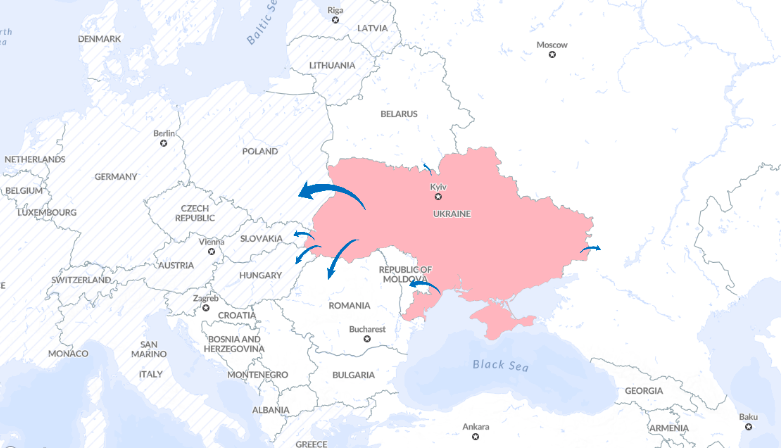
Primarily due to its limited capacity and even more limited financial resources, Moldova is a transitional zone for refugees. Though, the length of their stay depends on their economic status. Moldovan Ministry of Interior Principal Specialist Olesea Sirghi and Macovenco said the refugees who remain for more than two days cannot afford passage to EU countries.
‘Oligarchs Who Drink, Complain and Chase Women’
This reporter learned from local people that the first wave of refugees was made up of almost exclusively wealthy elites.
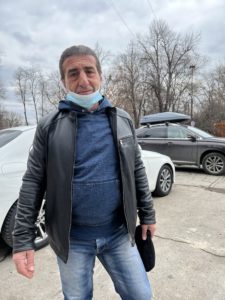
Misha Tsarkisan is a Georgian migrant who has lived for years in Moldova and does maintenance work near one of Chisinau’s primary refugee centers. He described the initial wave as “oligarchs, who came to drink, complain and chase women.”
Similar sentiments can be heard everywhere in the capital, though they are often expressed with more nuance. Ion Popov, 25, moved his coffee truck near a bus depot that dealt with the influx of refugees. He told Toward Freedom the arrivals were as mixed in their attitudes and temperament as any group might be.
“The rich loaded their things up in their cars with as much money as they could gather, and have generally behaved rudely,” Popov said. “I don’t know how you can be in such a situation and expect to make demands. But you know, many of these people are just caught in a bad situation, and many of them are perfectly decent.”
Moldova’s split identity, vacillating between former Soviet, Russian, Romanian and independently Moldovan, lends to these simmering tensions.
For less affluent refugees, the primary destination is the International Exhibition Center MoldExpo, the largest complex of any sort in the country. The scene on March 14 featured police checkpoints, buses coming and going, and makeshift kiosks-turned-sleeping-quarters. Visitors ranged from young volunteers to European reporters, as well as a troop of “Dream Doctors.” These entertainers were dressed as clowns to provide limited medical care. An Israeli non-governmental organization (NGO) had flown them in from Tel-Aviv (Occupied Jaffa).
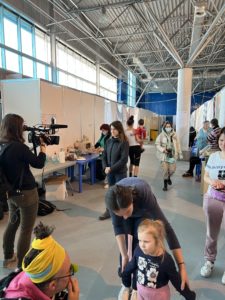
The center itself is a collection of concrete buildings, offset from a wooded park that boasts a Soviet-era “Hall of Fame” featuring a collection of statues: Karl Marx, Friedrich Engels and the towering centerpiece, Vladimir Lenin.
Inside the center, refugees are served food and drink, and can access donated items, such as clothing, diapers and medical equipment. About 200 people appeared to be in that case, sleeping on cots. The majority came from the southwestern Ukrainian cities of Odessa and Mykolayiv, but also from the capital, Kyiv.
From Chisinau, NGO-sponsored buses take off to EU countries, but most especially to Germany and Poland. In some cases, the embassies of EU countries are paying for the buses. According to the aforementioned Moldovan officials as well as an NGO representative, the EU has pledged about $20 million in support funds to Moldova. Far more buses await at the Romanian border, as Romania simply has more infrastructure as well as the presence of the North Atlantic Treaty Organization (NATO) and the United Nations. People with even modest means appeared able to find a way to arrange passage to Romania. But those Ukrainians who are completely destitute often remain in the shelter.
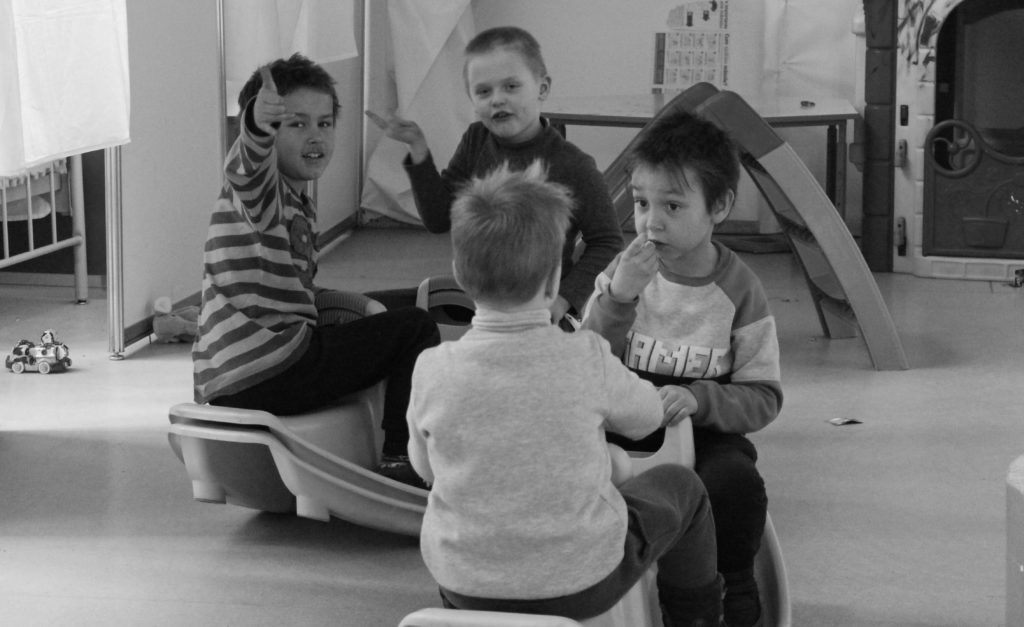
Refugees Speak Out
Contrary to the narratives with which the Western public has been inundated, Ukrainian refugees expressed largely divergent positions on the causes and potential outcomes of the conflict. This reporter witnessed EU-zone reporters gravitating toward the far fewer refugees who held pro-Kyiv positions. Not a single foreign press crew had a Russian- or Ukrainian-speaking member in tow, making it less likely they would hear from working-class Ukrainians, who mainly spoke Ukrainian or Russian.
Toward Freedom spoke at length in Russian with several refugees. What stood out was how few of them lent unequivocal support to the government of Ukrainian President Volodymyr Zelensky.
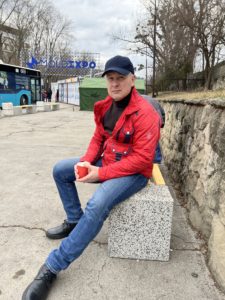
Alex Kirillov, a 40-year-old restaurateur originally from Donetsk, had left Kyiv four days earlier with his wife and three children. His main focus on the situation back in Ukraine was what he called a “real problem with nationalist aggression.” He saw no way out of the war without compromise and neutrality. Kirillov said the war had begun eight years ago. “Zelensky’s breaking of the Minsk agreements [ceasefires in Donbass brokered between Moscow and Kyiv] was the only reason this new stage of the war began.” He described pre-2014 Ukraine as “very calm, not as stable as the USSR, but much better than after Maidan, when things became economically unstable and full of war.” Maidan was the series of 2013-14 protests that led to the coup that ousted democratically elected President Victor Yanukovych. Kirillov said the U.S. and NATO supply of weapons to Ukraine worsened the situation. “But, then of course, allies must do this.” He was adamant that Putin, whom he disliked, had zero intention of going past Ukraine, or of even annexing Ukraine itself, and that it was naive to believe otherwise.
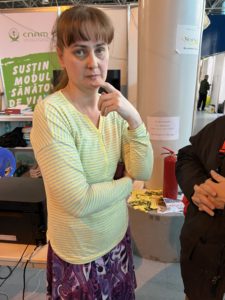
Claims have emerged that Russian and Ukrainian troops are being violent toward civilians and journalists. “We have no idea about any of this, as there is so much propaganda,” Kirillov said. “My house is safe, but we did hear bombs, and wanted to leave with the children.” Zelensky, in his eyes, had unwittingly allowed the United States to “poke the Russian bear.” He reiterated Ukrainians and Russians had always seen one another as brothers, a refrain this reporter repeatedly heard from refugees living at the MoldExpo. Then a large white charter bus appeared, he and his family said their goodbyes, and they were off to Belgium.
Oksana Novidskaya, from the southern Ukrainian city of Mykolayiv, found herself in the center with her two teenage children. Her 19-year-old daughter, Sofia, carried a 2-year-old. Novidskaya said a bomb went off near her former classmate’s house. That’s when she decided to leave with her children. “I am not interested in politics, nor do I understand them,” she said. “But I want Russia to stop attacking. All I know is that Russians and Ukrainians should help each other.” Her brother stayed back to fight with the Ukrainian army. As of March 11, he was still okay. When this reporter inquired about her thoughts on the Donbass, Novidskaya did not wish to discuss. Later, she secured a ride to Romania, so she could get to where her mother lives in Italy.
‘The West Was Silent’
Meanwhile, emphatic in opposition to the Ukrainian government was Alec Shevchenko, a 70-year-old former prosecutor from Kharkiv. He approached this reporter, eager to share his perspective, speaking with such vigor that a few dozen other refugees gathered around to witness the conversation.
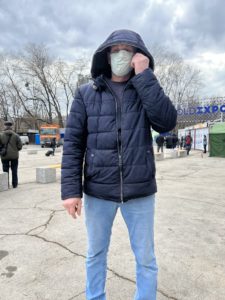
“This war started when the Ukrainian government began bombing homes in Donbass! The West was silent then. Millions of people live there, you know?”
A civil war began in Ukraine in 2014 after the majority Russian-speaking Donbass region containing two provinces, Donetsk and Lugansk, began breaking away from Ukraine after witnessing the neo-Nazi and nationalist-infused Maidan protests. The provinces announced their secession as independent republics after holding successful referenda. The 2015 Minsk agreements were intended to end the fighting. However, the Ukrainian government has violated the agreements to appease nationalists and neo-Nazis. Since then, more than 14,000 people have been killed in the eastern Ukrainian region and 1.5 million have been displaced.
Shevchenko, who had lived in Ukraine his entire life, then lit a cigarette and demanded this reporter take one as well. “After the Nuremberg Trials, there were no more fascists in the USSR. People from all the Soviet republics—Tajiks, Georgians, Russians, Ukrainians—all lived together happily. But after 1991, suddenly there were some Nazis again. And after 2014, they began to dominate things in Ukraine.”
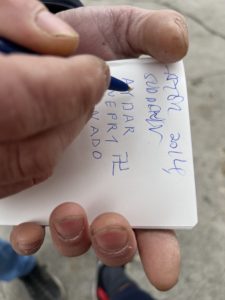
He grabbed this reporter’s notebook, and wrote down in Roman letters: “AYDAR, AZOV, DNEPRI, TORNADO”
Those are the names of Ukrainian military battalions. Then Shevchenko drew a swastika, and said in English, “These guys!” In his view, explicit Nazis were a minority in the government itself, which he described as full of “actors, athletes, ballerinas and clowns.”
The former prosecutor went on to say the United States and Kyiv had protected and encouraged the military battalions. Putin, in his eyes, was someone who moved deliberately. “He protects his people and his borders. If he was aggressive, like Hitler—as they are saying in Europe—he would have invaded Ukraine 8 years ago.” He gave a strong stare, and said, “Write this down: 80 percent of the Ukrainian people are glad that the Russian army has come. But they are terrified to say so publicly, especially now, because these Nazis will kill them.” The surrounding crowd appeared unfazed at his commentary.
Recent polls on the war have relayed Russian and U.S. public opinions. However, one poll conservative British billionaire Michael Ashcroft conducted March 1 to 3 claims most Ukrainians disfavor Russia, see Russians as kin, favor Europe, approve of NATO expansion, prefer not to leave Ukraine and wish to pick up arms to defend Ukraine.
What was clear in these and other exchanges is the reality of the East-West split in Ukraine, with anti-Russian sentiment the strongest in the west. “[Russians] would never want to kill Ukrainians for no reason,” one refugee, Dima Chumak, 48, of Mykolayev, told Toward Freedom during the conversation with Shevchenko. “But the nationalists want to kill Russians in the east for fun.” What is certain is, like in Syria, Iraq and other U.S.-inspired conflicts, public opinion on the ground is not as uniform as the Western press makes it seem.
Fergie Chambers is a freelance writer and socialist organizer from New York, reporting from eastern Europe for Toward Freedom. He can be found on Twitter, Instagram and Substack.
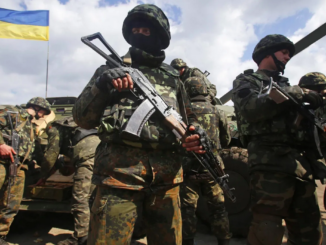
Ukrainian Leftist Criticizes Western War Drive with Russia: United States Using Ukraine As ‘Cannon Fodder’
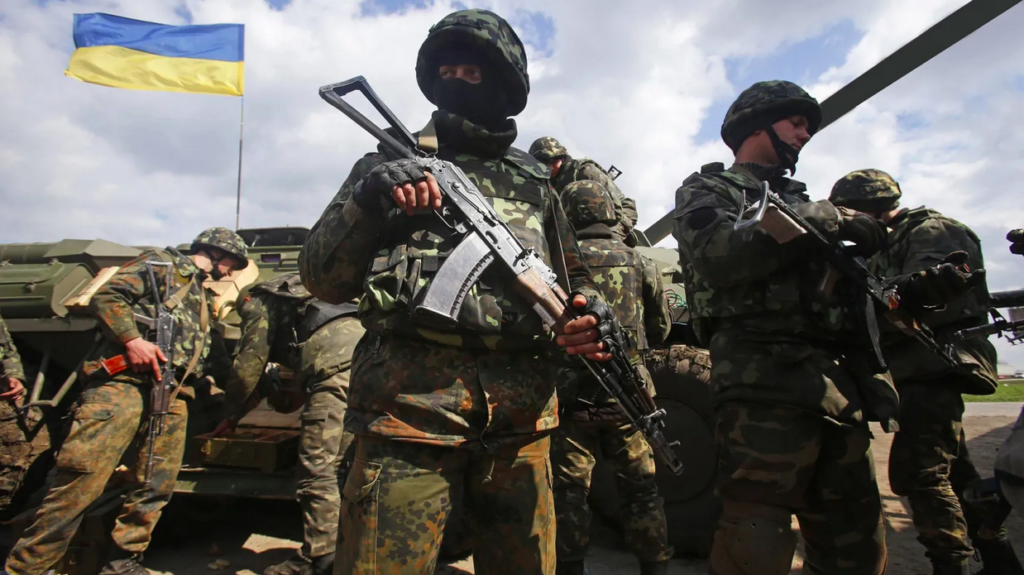
Editor’s Note: The article was originally published by Multipolarista.
I am a Ukrainian-American. I grew up and spent over half of my life in Ukraine, although now I live in the United States. I wanted to explain my thoughts on the ongoing crisis with Russia, because mainstream corporate media outlets don’t ever share perspectives like mine.
It is definitely a stressful time, for obvious reasons. Fortunately, my family and friends in the country are alive and are doing well enough under the circumstances. Unfortunately, in the past decade this isn’t the first time I have had to check in on my loved ones there, and for basically the same reasons. This is what I wanted to talk about.
You see, the U.S. government has meddled in Ukraine for decades. And the Ukrainian people have suffered because of this.
The overwhelming support that Western governments and media outlets have poured out for Ukraine since Russia invaded on February 24 is not actually motivated by concern for the Ukrainian people. They are using us to advance their political and economic interests.
We know this because Washington overthrew our government twice in a decade, imposed neoliberal economic policies that made our country the poorest in Europe, and has fueled a devastating civil war that in the past eight years took the lives of 14,000 Ukrainians and wounded and displaced many more.
The following facts don’t get mentioned by the media, as they contradict the foreign-policy goals of the U.S. government. So unless you are actively engaged in the anti-war movement, the info below is probably new to you. That is why I wanted to write this article.
The first U.S.-backed soft coup in Ukraine occurred in 2004, when Western-backed presidential candidate Viktor Yushchenko lost the election.
The winner of the November 2004 vote, Viktor Yanukovych, was portrayed as being pro-Russian, so Western governments refused to recognize his victory and declared electoral fraud.
Western-backed forces in Ukraine then mobilized and carried out a textbook color revolution, called the “Orange Revolution.” They forced another run-off vote that December, in which their candidate Yushchenko was declared president.
In a shockingly honest 2004 report titled “U.S. campaign behind the turmoil in Kiev,” Britain’s establishment newspaper The Guardian admitted that the “Orange Revolution” was “an American creation, a sophisticated and brilliantly conceived exercise in western branding and mass marketing,” bankrolled with at least $14 million.
“Funded and organised by the U.S. government, deploying US consultancies, pollsters, diplomats, the two big American parties and U.S. non-government organisations, the campaign” attempted to topple governments “in four countries in four years,” The Guardian boasted, targeting Serbia, Georgia, Belarus, and Ukraine.

Much like in the United States, Ukrainian presidents are appointed and govern in the interest of wealthy oligarchs, so no Ukrainian president ends his tenure with a particularly high rating. The U.S.-backed Yushchenko, however, set a new record for the lowest popular support in history.
In the next presidential election, in 2010, Yushchenko got just 5% of the vote, which should give you an insight into how popular he actually was.
During his first term Yushchenko implemented a program of austerity, reduced social spending, bailed out large banks, deregulated agriculture, advocated for NATO membership, and repressed the rights of language minorities like Russian speakers.
The second U.S.-backed coup d’etat in Ukraine was launched in late 2013 and consolidated power in 2014, just a decade after the first one.
Viktor Yanukovych, who was frequently called pro-Russian by Western media but in reality was just neutral, won the 2010 presidential election fair and square.
But in 2013, Yanukovych refused to sign a European Union Association Agreement that would have been a step toward integrating Ukraine with the EU. In order to be part of this program, Brussels had demanded that Kiev impose neoliberal structural adjustment, selling off government assets and giving the Washington-led International Monetary Fund (IMF) even more control over Ukrainian state spending.
Yanukovych rejected this for a more favorable offer from Russia. So, once again, Western-backed organizations brought out their supporters into the Maidan Square in Kiev to overthrow the government.
As was the case during the “Orange Revolution” in 2004, the United States sent politicians to meet with the leaders of the demonstrations, and later coup leaders, in late 2013 and early 2014. U.S. Senators John McCain, Chris Murphy, and others spoke in front of large crowds in Maidan.

At some point the control of the stage and leadership of the protests was overtaken by far-right forces. Leaders of such organizations as Svoboda (a neo-Nazi party) and Right Sector (a coalition of fascist organizations) spoke to the protesters, sometimes standing side-by-side with their American backers like McCain.
Later their organizations acted as the spear of attack against the Ukrainian police in the violent February 2014 coup d’etat, and they were the first to storm government buildings.
With the success of the U.S.-backed forces and fascists, President Yanukovich fled the country to Russia.
U.S. government officials met with coup leaders and appointed a right-wing neoliberal, Arseniy Yatsenyuk, to lead the new regime, because they recognized they couldn’t appoint the fascists and maintain legitimacy.
A leaked recording of a phone call between Victoria Nuland, the assistant secretary of state for European and Eurasian affairs, and the U.S. ambassador in Kiev, Geoffrey Pyatt, showed that Washington chose who the leaders of the new coup regime would be.
Nuland referred to Yatsenyuk affectionately as “Yats,” saying, “Yats is the guy.”
The first actions of the post-2014 coup government were to ban left-wing parties in the country and reduce language-minority rights even further. Then Ukrainian fascists attacked anti-coup demonstrations in the streets all over the country.
As the anti-coup protests were being violently broken up by the far-right, two areas in the east of the country, Donetsk and Luhansk, rose up and declared independence from Ukraine.
The people of Crimea also voted to leave Ukraine and join Russia. Crimea has a Russian military base, and under their protection they were able to vote safely.
The people in Donetsk and Luhansk were less lucky. The coup government dispatched the military to suppress their insurrections.
At first many Ukrainian soldiers refused to shoot at their own countrymen, in this civil war that their U.S.-backed government started.
Seeing the hesitation of the Ukrainian military, far-right groups (and the oligarchs that were backing them) formed so-called “territorial defense battalions,” with names like Azov, Aidar, Dnipro, Tornado, etc.
Much like in Latin America, where U.S.-backed death-squads kill left-wing politicians, socialists, and labor organizers, these Ukrainian fascist battalions were deployed to lead the offensive against the militias of Donetsk and Luhansk, killing Russian-speaking Ukrainians.
In May 2014, neo-Nazis and other far-right forces assaulted an anti-coup demonstration in the major city of Odessa. 48 people were burned alive in a labor union building.
This massacre added more fuel to the civil war. The Ukrainian government promised to investigate what happened, but never really did.
My point: Without understanding the Maidan massacre and bringing to justice its perpetrators, it is impossible to understand and resolve peacefully the internal and international conflicts involving Ukraine and the dangerously escalating war in the Donbas. https://t.co/Hxyq0L4sA8
— Ivan Katchanovski (@I_Katchanovski) February 23, 2022
After the 2014 coup, Ukraine held an election without any serious opposition candidates, and Western-backed billionaire Petro Poroshenko won.
Poroshenko was seen as the most “moderate” of the right-wing coup coalition. But that didn’t mean much, considering many opposition parties were banned or assaulted by the far-right when they tried to organize.
Additionally, the areas that would have heavier support for the voices who wanted peace with Russia, such as Crimea and the Donbas, had seceded from Ukraine.
The new president had the impossible task of trying to appear sufficiently patriotic for the far-right while at the same time sufficiently “respectable” for the West to continue backing him publicly.
To appease the far-right, Poroshenko gave out awards to World War Two veterans “on both sides,” including the ones that fought in Nazi Germany-aligned militias like the fascist Organization of Ukrainian Nationalists and Ukrainian Insurgent Army.
The Ukrainian government officially honored the leaders of these organizations, Stepan Bandera and Roman Shukevych, who organized massacres of many thousands of Poles, Jews, Russians, and other minorities during World War Two, and who willingly participated in the Holocaust.
The holiday Defenders of Ukraine Day, or Day of Ukrainian Armed Forces, was changed to October 14, to match the date of founding of the Nazi-backed Ukrainian Insurgent Army.
This is why you sometimes see red-and-black badges on Ukrainian soldiers. This symbol shows support for the fascist Ukrainian forces during World War Two.
Canada’s Deputy Prime Minister, Chrystia Freeland, shared of photo of herself holding a fascist symbol at a rally where the same fascist flag was everywhere. And yet, Canadian media has ignored it completely.
NEW from @DavideMastracci. https://t.co/eZW4qCP5B8
— Passage (@readpassage) March 1, 2022
(Also I have to make a separate but important point here: Ukraine was previously part of the Soviet Union, and the majority of the Ukrainian population during World War Two supported the Red Army and actively resisted Nazi occupation of their country. The Ukrainian fascist collaborationists and parties did not have as broad support as the anti-fascist resistance did, and were mostly active during the period of Nazi occupation.)
A large portion of the civil war that broke out in Ukraine after the 2014 coup was waged under Poroshenko.
From 2014 to 2019, in five years of civil war in Donbas, the geographic region that encompasses the Luhansk and Donetsk republics, more than 13,000 people were killed, and at least 28,000 were wounded, according to official Ukrainian government statistics. This was years before Russia invaded.
The Ukrainian army and its far-right paramilitary allies were responsible for the vast majority of civilian casualties, with the United Nations reporting in January 2022 that, between 2018 and 2021, 81.4% of all civilian casualties caused by active hostilities were in Donetsk and Luhansk.
These are Russian-speaking Ukrainians being killed their own government. They are not secret Russian forces.
Researchers at the U.S. government-sponsored RAND Corporation acknowledged in a January 2022 report in Foreign Policy magazine that, “even by Kyiv’s own estimates, the vast majority of rebel forces consist of locals—not soldiers of the regular Russian military.”
Meanwhile, millions of Ukrainians fled the country due to the conflict, especially from the eastern regions that saw most of the fighting.
The United States strongly supported Poroshenko and the Ukrainian government as it was waging this brutal war that killed thousands, injured tens of thousands, and displaced millions.
This is why I say the U.S. government doesn’t actually care about Ukraine.
In 2019, the Ukrainian people clearly showed that they opposed this war by overwhelmingly voting against Poroshenko at the ballot box. Current Ukrainian president Volodymyr Zelensky got 73% of the vote, compared to just 24% for Poroshenko.
Zelensky ran on a platform of peace. He even addressed the Russian-speaking eastern parts of the country in Russian.
Very quickly after entering office, however, Zelensky changed his tone. Much like the supposedly “moderate” Poroshenko, Zelensky was told that he was risking losing Western backing, and the loyalty of the far-right, which could threaten to kill him.
So Zelensky did a 180 on his peaceful rhetoric, and he continued to support the civil war.
Here it is important to address another important point: The Ukrainian government is not directly run by fascists, but in Ukraine fascist forces do have significant influence in the state.
After the 2014 U.S.-backed coup, neo-Nazis were absorbed by Ukraine’s military, police, and security apparatus.
So while the parliamentary representation of fascist parties is not large (they often get just a few percentage points of the vote in elections), these extremists continue to be supported by taxpayers’ money through unelected state institutions.
Additionally, these neo-Nazis have the street muscle to terrorize political opponents. They can quickly mobilize dozens or hundreds of people on a moment’s notice to attack opponents.
Moreover, these fascists are highly motivated combatants that ensure the loyalty of the Ukrainian military. They represent a powerful faction of the Ukrainian political spectrum, and one of the forces in Ukrainian society that pushes for escalating war with the separatist regions and Russia.
I sometimes see people try to reject this fact by saying, “How can Ukraine have all these Nazis if their president is Jewish?” Here is the answer: the Nazis are not appointed by Zelensky.
These fascists have a major influence in the unelected state security apparatus. The have systematically infiltrated the military and police. And they even enjoy support and training from Western governments and NATO.
NATO is sending weapons and trainers to help neo-Nazis in Ukraine’s white-supremacist Azov movement fight Russia, as the US floods the country with weapons.
This follows numerous reports of Western government support for Ukrainian far-right extremists.https://t.co/5gYgmU8PFo
— Benjamin Norton (@BenjaminNorton) March 10, 2022
The position of fascists grew substantially stronger in Ukraine in the eight years of the civil war, from 2014 to 2022.
For those reasons Ukrainian presidents (Jewish or not) have to take the position of the far-right into consideration. (Not to mention the possibility that far-right gangs could threaten to kill the president or other politicians if they defy them.)
Furthermore, all forces that normally oppose fascism or would oppose the civil war have not existed en masse for eight years in Ukraine: following the 2014 coup, many left-wing parties and socialists got banned by the Ukrainian government, and were assaulted in the streets by the fascists.
Any Ukrainian president, especially since the coup, is highly dependent on the support of the U.S. government as well. So Zelensky is very much a hostage of the situation.
When Washington tells Zelensky he must continue the civil war in Ukraine against his own electoral promises, support NATO membership, ignore the Minsk II agreement of 2015, or even ask for nuclear weapons, he does everything he is told.
Like any other U.S. puppet regime, Ukraine doesn’t have any real independence. Kiev has been actively pushed to confront Russia by every U.S. administration, against the will of the majority of Ukrainian people.
The fact that most Ukrainians wanted peace with Russia was reflected by the fact that they voted for the peace candidate Zelensky in such overwhelming numbers, 73%. And the fact that Zelensky did a total 180 on that promise shows how little political power he actually has.
Now to circle back to the present moment and what to do now. I don’t support the invasion Russia is carrying out. But the only government I can influence by the virtue of living in the United States is the U.S. government.
Luckily, that is extremely relevant, because Washington is one of the root causes of what is happening in Ukraine now.
For the past eight years, I spoke out against the coup and the civil war in Ukraine that the United States supported, promoted, and funded.
While I never thought a war with Russia was possible, I and many other Ukrainians are against Ukraine joining NATO and escalating tensions with the separatist republics and Moscow.
Any further escalation by the U.S. right now can only lead to a larger war.
I even hear some U.S. politicians playing around with the idea of a “no-fly zone,” which means they are calling for NATO to shoot down Russian planes. This is the quickest way to World War Three.
The support for Ukraine that fills the Western media now is not out of real solidarity with the people of Ukraine. If that were the case, the U.S. wouldn’t have overthrown our government twice in a decade; it wouldn’t have supported the policies that made us the poorest country in Europe; it wouldn’t have fueled a brutal civil war for the past eight years.
The reason U.S. media outlets and politicians are all backing Ukraine now is because they want to use the Ukrainian military and civilian population as cannon fodder in a proxy war with a political adversary.
Washington is willing to fight until the last Ukrainian to weaken Russia.
For that reason, I am absolutely against U.S. sanctions in general, and this round of U.S. sanctions against Russia in particular.
The harsh Western sanctions imposed on Russia target the civilian population.
Sanctions don’t affect ruling elites, and all U.S. sanctions ever do is collectively punish working-class people of a country where Washington doesn’t like their government.
Devaluing the Russian currency, the ruble, is effectively a form of shrinking workers’ wages, cutting the pensions of retirees, and preventing regular people from being able to access food or medicine.
This isn’t to mention the cost that these sanctions are now also having on the people in the United States itself, with gas prices as high as $6 a gallon and even $7 in parts of California.
The skyrocketing oil prices caused by this crisis will lead to more inflation. And while the official U.S. inflation figure is 7.5%, the real number is probably in the double digits.
All of this makes life harder for average working people, in Ukraine, Russia, the U.S., and around the world.
Another factor in the Ukraine crisis is the rampant surge of russophobia.
Since Hillary Clinton lost the 2016 presidential election, Democrats have blamed Donald Trump’s victory on Russian hacking without any solid proof. All of the supposed evidence they presented fell apart when investigated.
Many U.S. politicians demonized Russia as much as they could, just to push the blame for their candidate losing on someone else.
Now Russia’s February invasion of Ukraine has made it okay to be openly xenophobic. I have even seen some people call for killing all Russians, boycotting all Russian businesses, revoking student visas for Russians, etc.
Even in the more “respectable” media, you see talking heads speaking about Russian people as if they’re not human.
Under Donald Trump, many of these same people demonized China, and then acted surprised when there was a wave of hate crimes in the U.S. against East Asians.
During the U.S. invasion of Iraq, the press demonized Arabs and Muslims, leading to hate crimes against their communities.
My point is that demonizing nationalities is never acceptable, and people can see through the flimsy excuses of hiding one’s own xenophobia behind the declarations of “solidarity” with my country.
In conclusion, I wanted to say that, if you live in the United States, the only government you can actually influence through demonstrations and other forms of protest is our own.
I absolutely think it is a crime right now to support the U.S. government’s drive for war, sanctions, or further escalation of tensions in Ukraine.
The U.S. government has been stoking this conflict for decades. Washington has funded coups and fueled a civil war in Ukraine.
Now, U.S. corporations stand to greatly benefit from what is happening.
The government doesn’t care about the people here in the U.S., and the only reason it says it cares about people abroad is so it can justify further military spending and advance its foreign-policy goals – which aren’t good for anyone except for a handful of rich American oligarchs.
